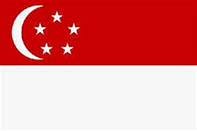Why to invest in Singapore


| Singapore at a glance | |
|---|---|
| LOCATION | South East Asia |
| CAPITAL | Singapore |
| OFFICIAL LANGUAGE | English, Malaysian, Mandarin Chinese and Tamil. |
| CURRENCY | Singapore Dollar |
| POPULATION | 5,470,000 inhabitants 2014 |
| AREA | 718.3 km2 |
| POLITICAL SYSTEM | Parliamentary Republic |
| GDP | 307.9 thousand million US$ 2014/ 56,286.80 US$ per capita 2014 |
| Source of economic figures: World Bank | |
Due to its political stability and continued economic growth, the independent region of Singapore is considered one of the most prosperous areas of South East Asia to establish commercial and financial relations.
Singapore has a strategic geographic location as it is at the meeting point of various maritime routes, which provides it competitive advantages to do business on neighbouring markets such as China and India. The last reports by the World Bank on Direct Foreign Investment classify Singapore as one of the countries where it is most easy for foreign investors to become established, emphasising the ease to form companies, its high technological capacity and infrastructures.
Singapore has designed a highly appropriate legal and tax regime for foreign investments, offering attractive tax advantages for such business. Moreover, its interest to adapt and integrate in the international standards cause it to be considered one of the safest Asian jurisdictions for business.
Taxation and Type of Companies
The tax system is based on a criteria of territorial revenue, both for resident natural as well as legal persons, which means that only revenue obtained in the territory of Singapore is taxed.
There is no wealth tax or inheritance tax in Singapore.
Taxation of Individuals
Personal income tax for natural persons is defined by bands and normally ranges from 2% to 20 %, according to the volume of revenue received in the local territory during the financial year
Taxation of Corporate Entities
The general company tax rate is 17%, although there is a 75% exoneration on the first 10,000 Singapore Dollars, while there is a 50% exoneration for the following 290,000 Singapore Dollars.
The Value Added Tax (VAT) rate in Singapore is 7%. Provision of international services, as well as exports of assets, financial product purchase transactions and purchase of precious metals are VAT exempt.
Characteristics of Singapore Limited Liability Companies
There are now various types of companies in Singapore . The most common are limited liability companies, that are registered at the Business Registry of Singapore.
Limited liability companies have the following characteristics:
The minimum stock capital is one Singapore Dollar (SGD 1). The shares must be nominative.
They require at least one shareholder, who may be natural or legal person, resident or foreign.
They require a registered office and a Secretary who is resident in Singapore, the latter may be a natural or legal person.
They require at least one director, who must be a natural person, resident in Singapore. If more directors are appointed, they may be non resident natural persons.
The companies must perform accounting control, it being mandatory for an annual external audit to be carried out. That requisite is not applicable to firms considered small companies, by virtue of the enactment in July 2015 of the amendments to the Companies Act of Singapore.
Benefits of the Singapore Corporate System
Singapore operates a territorial revenue system which means that all revenue generated abroad is fully tax exempt.
Moreover, Signapore has no capital gains tax.
Conventions
Singapore is on the white list of OECD countries and signed the FATCA convention with the United States in 2014.
Network of Conventions to Avoid Double Taxation
Signapore has an ample network of conventions to avoid double taxation. For more details, consult our summary of the networks of conventions to avoid double taxation ....
Network of Information Exchange Agreements
Apart from the Double Taxation Conventions, Signapore has signed an Information Exchange Convention with Bermuda.
